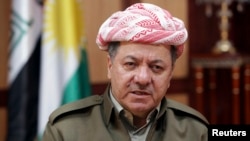BAGHDAD —
Iraqi Kurdistan is ready to defend Kurds living in Syria if it is found that they are being threatened by al-Qaida-linked fighters involved in the Syrian civil war, the president of the well-armed autonomous region said.
In a letter posted online on Saturday, Masoud Barzani said he had directed Kurdish representatives to go to neighboring Syria to investigate news reports that the "terrorists of al-Qaida are attacking the civilian population and slaughtering innocent Kurdish women and children."
His statement was a further sign of how Syria's two-year conflict is spilling over its borders and aggravating sectarian tensions in adjacent countries.
Exploiting Syrian President Bashar al-Assad's receding territorial grip on the country, Syrian Kurds have carved out de facto autonomy in the far northeast where their population is concentrated. But they have also clashed with Sunni Muslim jihadi fighters spearheading the insurgency against Assad.
"If the reports are true, showing that citizens, women and the children of innocent Kurds are under threat from murder and terrorism, Iraq's Kurdistan region will make use of all of its capabilities to defend women and children and innocent citizens," Barzani's statement said. He did not elaborate on the nature or extent of possible intervention from Kurdistan.
Barzani's letter was sent on Thursday to the preparatory committee for a Kurdish National Conference to be held in the northern Kurdistan city of Arbil later this month. The panel includes envoys from Iraq, Syria, Turkey and Iran. Barzani asked this committee to form another panel that would go into Syria.
Posted on the Kurdistan Regional Government (KRG) website, Barzani's statement referred to areas in Syria as "Western Kurdistan." Spread over large, adjoining tracts of Iraq, Syria, Turkey and Iran, the Kurdish people are often described as the largest ethnic group without their own state.
The northern Iraqi region of Kurdistan, which has its own government and armed forces, is pursuing increasingly independent energy and foreign policies, infuriating the Shi'ite Muslim-dominated central government in Baghdad.
Iraqi Kurds have sent fuel, food and medical aid to their ethnic kin over the border in Syria, extending Barzani's influence, but Saturday's statement appeared to be the first time that he had suggested intervention.
In Syria, where they make up about 10 percent of the population, Kurds have been widely discriminated against under Assad and his late father before him, who stripped more than 100,000 of their citizenship.
For some Syrian Kurds, the insurrection against Assad presents an opportunity to win the kind of rights enjoyed by their neighbors in Iraqi Kurdistan.
Kurdistan's approach to Syria contrasts with that of the Baghdad government. Prime Minister Nuri al-Maliki, a Shi'ite, has said Iraq will not interfere in the conflict. His interests are aligned with those of Shi'ite Iran, which backs Assad.
In a letter posted online on Saturday, Masoud Barzani said he had directed Kurdish representatives to go to neighboring Syria to investigate news reports that the "terrorists of al-Qaida are attacking the civilian population and slaughtering innocent Kurdish women and children."
His statement was a further sign of how Syria's two-year conflict is spilling over its borders and aggravating sectarian tensions in adjacent countries.
Exploiting Syrian President Bashar al-Assad's receding territorial grip on the country, Syrian Kurds have carved out de facto autonomy in the far northeast where their population is concentrated. But they have also clashed with Sunni Muslim jihadi fighters spearheading the insurgency against Assad.
"If the reports are true, showing that citizens, women and the children of innocent Kurds are under threat from murder and terrorism, Iraq's Kurdistan region will make use of all of its capabilities to defend women and children and innocent citizens," Barzani's statement said. He did not elaborate on the nature or extent of possible intervention from Kurdistan.
Barzani's letter was sent on Thursday to the preparatory committee for a Kurdish National Conference to be held in the northern Kurdistan city of Arbil later this month. The panel includes envoys from Iraq, Syria, Turkey and Iran. Barzani asked this committee to form another panel that would go into Syria.
Posted on the Kurdistan Regional Government (KRG) website, Barzani's statement referred to areas in Syria as "Western Kurdistan." Spread over large, adjoining tracts of Iraq, Syria, Turkey and Iran, the Kurdish people are often described as the largest ethnic group without their own state.
The northern Iraqi region of Kurdistan, which has its own government and armed forces, is pursuing increasingly independent energy and foreign policies, infuriating the Shi'ite Muslim-dominated central government in Baghdad.
Iraqi Kurds have sent fuel, food and medical aid to their ethnic kin over the border in Syria, extending Barzani's influence, but Saturday's statement appeared to be the first time that he had suggested intervention.
In Syria, where they make up about 10 percent of the population, Kurds have been widely discriminated against under Assad and his late father before him, who stripped more than 100,000 of their citizenship.
For some Syrian Kurds, the insurrection against Assad presents an opportunity to win the kind of rights enjoyed by their neighbors in Iraqi Kurdistan.
Kurdistan's approach to Syria contrasts with that of the Baghdad government. Prime Minister Nuri al-Maliki, a Shi'ite, has said Iraq will not interfere in the conflict. His interests are aligned with those of Shi'ite Iran, which backs Assad.





